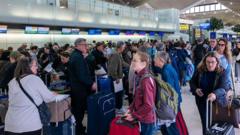Air traffic controllers at Newark Liberty International Airport faced a critical communication breakdown last week, which lasted for approximately 30 seconds. This incident, reported on April 28, resulted in numerous delays and cancellations, with over 150 flights reported by tracking services as canceled on the following Monday. Following the breakdown, multiple controllers went on trauma leave, leading to heightened staffing shortages at one of New York's busiest airports.
US Transportation Secretary Sean Duffy explained the communications outage occurred as the primary communication line failed when the backup system also faltered. Although he assured that aircraft were not in immediate danger—thanks to onboard communication devices—he recognized this incident as indicative of a fragile operational system that desperately needs modernization.
The Federal Aviation Administration (FAA) corroborated that the outdated air traffic control system is stressing its workforce, complicating operations at Newark. As controllers took time off in response to this incident, the FAA revealed the ongoing challenge of quickly replacing them, despite actively training new personnel for the demanding airspace.
The cancellation and diversion of flights have drawn criticism from airlines such as United Airlines, which recently had to withdraw 35 flights daily from Newark due to its inability to accommodate the volume of scheduled aircraft. United's CEO Scott Kirby noted that recent technology failures faced by FAA controllers have exacerbated the travel chaos.
The National Air Traffic Controllers Association reported that employees were leveraging their rights to take leave under trauma provisions but declined to disclose how many controllers took leave or how long they were disconnected from ongoing flights.
In light of this incident, the U.S. Department of Transportation recently announced a plan to enhance FAA air traffic controller numbers, aiming to onboard at least 2,000 new controllers this year. Additionally, Secretary Duffy intends to propose significant financial resources for a comprehensive overhaul of the air traffic control infrastructure, embracing new technologies and systems to better support air travel safety and efficiency.



















